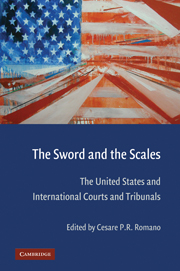Book contents
- Frontmatter
- Contents
- Preface
- Acknowledgments
- Abbreviations
- Contributors
- 1 International Courts and Tribunals and the Rule of Law
- 2 American Public Opinion on International Courts and Tribunals
- 3 Arbitration and Avoidance of War: The Nineteenth-Century American Vision
- 4 The United States and the International Court of Justice: Coping with Antinomies
- 5 The U.S. Supreme Court and the International Court of Justice: What Does “Respectful Consideration” Mean?
- 6 U.S. Attitudes toward International Criminal Courts and Tribunals
- 7 The United States and the Inter-American Court of Human Rights
- 8 From Paradox to Subsidiarity: The United States and Human Rights Treaty Bodies
- 9 The U.S. and International Claims and Compensation Bodies
- 10 Does the United States Support International Tribunals? The Case of the Multilateral Trade System
- 11 The United States and Dispute Settlement under the North American Free Trade Agreement: Ambivalence, Frustration, and Occasional Defiance
- 12 Dispute Settlement under NAFTA Chapter 11: A Response to the Critics in the United States
- 13 The United States and International Courts: Getting the Cost-Benefit Analysis Right
- Index
- References
10 - Does the United States Support International Tribunals? The Case of the Multilateral Trade System
Published online by Cambridge University Press: 05 June 2012
- Frontmatter
- Contents
- Preface
- Acknowledgments
- Abbreviations
- Contributors
- 1 International Courts and Tribunals and the Rule of Law
- 2 American Public Opinion on International Courts and Tribunals
- 3 Arbitration and Avoidance of War: The Nineteenth-Century American Vision
- 4 The United States and the International Court of Justice: Coping with Antinomies
- 5 The U.S. Supreme Court and the International Court of Justice: What Does “Respectful Consideration” Mean?
- 6 U.S. Attitudes toward International Criminal Courts and Tribunals
- 7 The United States and the Inter-American Court of Human Rights
- 8 From Paradox to Subsidiarity: The United States and Human Rights Treaty Bodies
- 9 The U.S. and International Claims and Compensation Bodies
- 10 Does the United States Support International Tribunals? The Case of the Multilateral Trade System
- 11 The United States and Dispute Settlement under the North American Free Trade Agreement: Ambivalence, Frustration, and Occasional Defiance
- 12 Dispute Settlement under NAFTA Chapter 11: A Response to the Critics in the United States
- 13 The United States and International Courts: Getting the Cost-Benefit Analysis Right
- Index
- References
Summary
The World Trade Organization's (WTO's) dispute settlement system represents an unprecedented grant of legal authority to international tribunals to enforce international legal norms, backed by the threat of economic sanctions. The United States was not only the principle demandeur of this system but also has been the most active participant. At first glance, the U.S. approach to dispute settlement in the trade area appears to contrast sharply with its approach to legalized dispute settlement in many other areas of international relations. Indeed, the United States' leading role in this area seems even more remarkable in light of the country's history of economic protectionism.
However, a closer look at the history of U.S. approaches to the resolution of trade disputes suggests that a more nuanced appraisal is in order. This history reveals that although the United States has generally supported rule-based approaches to settling trade disputes, at times it has evidenced ambivalence about the normative desirability and practical utility of a legalized dispute settlement process in the trade area. It also suggests that U.S. government support for judicialized dispute settlement in international trade is based less on an abstract commitment to the rule of law in international relations than on pragmatic, short-term, and highly contextual calculations that this mechanism serves U.S. interests better than alternative arrangements. Finally, this history suggests that the level of U.S. commitment to, and participation in, legalized trade dispute resolution mechanisms reflects a two-level game in which U.S. officials mediate conflicting pressures generated by their foreign counterparts and domestic political actors.
- Type
- Chapter
- Information
- The Sword and the ScalesThe United States and International Courts and Tribunals, pp. 322 - 355Publisher: Cambridge University PressPrint publication year: 2009
References
- 1
- Cited by



